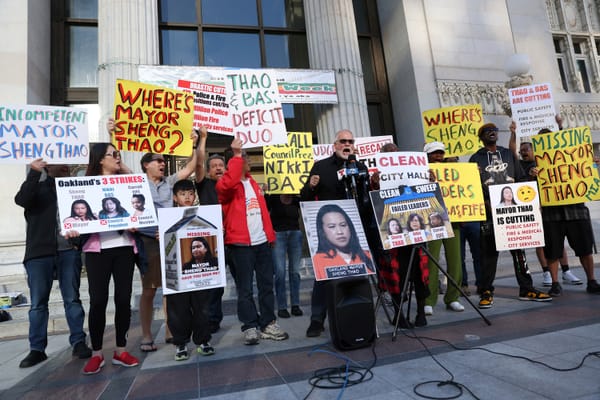Oakland politics are heating up. On July 9, the City Council voted to place a recall referendum for Mayor Sheng Thao on the November ballot. Public discussion has focused on last month’s raid on the mayor’s home by the FBI, IRS, and US Postal Service in a broad but as-yet-opaque investigation into allegations of corruption and money laundering. Yet the campaign against Thao has other motivations—and ignoring them would be a big mistake.
Spearheaded by retired Alameda County Superior Court Judge Brenda Harbin-Forte and members of Oakland’s minority communities, the campaign gathered more than 40,000 voter signatures in favor of the city’s first-ever mayoral recall—more voters, in fact, than those who supported Thao in the first round of the city’s ranked-choice election system in 2022. These regular Oaklanders have had enough of rising crime and civic neglect under progressive governance.
Positioned in opposition to this coalition is a dwindling but die-hard cadre of progressives who have feebly attempted to smear recall organizers and supporters as right-wing extremists. This includes the mayor herself. In her first public appearance after the multi-agency raid, Thao claimed that she had been targeted by “radical right-wing forces” working to remove her from office.
These claims, however, are preposterous. In fact, Thao’s political troubles owe to a remarkably post-partisan grassroots movement, driven by ordinary people who just want the city to function properly. Many frontline organizers are proud native Oaklanders, including descendants of Southern black migrants. Others are first-generation immigrants. Some, like myself, are former progressives, working to reconcile our ideals with the phony progressive policies and politicians that have brought our city to a crisis point. None of us is happy that we have been sold a lie—and we are in full revolt against those at fault.
Oakland’s working class has been alienated from the political process. The city, like many others, is geographically split between rich and poor areas. While the wealthy generally make their homes in the hills, the working class tends to live in the eastern flatlands. In “a little country called Deep East Oakland,” as locals call it, voters turn out far less than do their counterparts in the hills. Flatlands residents, like most working- and lower-middle-class people, have neither the time or the income to fully engage in local politics. To make matters worse, the City Council recently changed its meeting times from 4 p.m. to 1:30 p.m., further discouraging working Oaklanders from participation. This, just as they have begun to raise their voices to demand better public safety and accountability from elected officials.
Over the past decade, Oakland progressives have ridden a wave of enthusiasm for various social-justice causes to power. Buoyed by public-sector unions and the Alameda County Democratic Central Committee, progressive candidates have received significantly more funding than moderates, alongside sycophantic exaltations from media organs hailing them as heroes of the working class. As a result, low-information voters regularly vote for familiar progressive incumbents over their pro-business challengers. I, too, voted the same way for most of my adult life. But my disengagement, as well as that of countless other Oaklanders, is over.
As progressive politicians increasingly damaged the city’s social fabric, neglecting high crime and onerous business conditions, some onetime supporters gradually came to realize that we had fallen victim to a bait-and-switch. While we naïvely believed that progressives were serving the interests of Oakland’s rank and file, our politicians cared for little more than cementing their own power.
Our private and public institutions are failing. All three of our professional sports teams have left the city in the last four years. In-N-Out fled, Denny’s has shuttered, and the Oakland Airport Hilton recently announced its impending closure. At the same time, the city faces a historic budget deficit and even potential bankruptcy. But our progressive class is still desperately trying to gaslight Oaklanders into believing that their policies are working.
The speed at which Oakland has collapsed reminds me of Marty McFly’s return to 1985 in Back to the Future Part II after his sojourn in a then-distant 2015. To his shock, as he walks the streets, cars are on fire, homeless camps pepper the landscape, and graffiti is everywhere. His actions unintentionally precipitated a dystopia. But while in the movie McFly worked to rectify his mistake, real-life Oakland progressives have refused to take even a shred of responsibility for their failures.
“It is fascinating to observe Oakland progressives’ addiction to denial.”
It is fascinating to observe Oakland progressives’ addiction to denial as the rest of the world watches the city descend into chaos—until you realize that this may only be the last stage before a full-scale civic breakdown. Thankfully, this isn’t inevitable—not if the city’s voters have their say starting this November.
Predominantly white progressive politicians and activists are furious at working-class Oaklanders for trying to wrestle political power back from our failed leaders. It’s the unhinged anger of malignant narcissists whose scapegoating and gaslighting may at last be coming to an end. Finally, Oakland’s working class has found its voice—and it may just set an example for the rest of America.
Correction: An earlier version of this article incorrectly suggested that the Oakland NAACP has formally backed the recall referendum. While individual members have supported the recall drive, the organization has yet to vote on a resolution on the matter.
